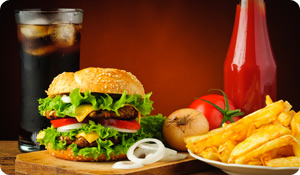
Processed foods—which include everything from soda to fast food to boxed mac and cheese—can boost your risk of obesity, digestive disorders, and heart disease. Now researchers have found another good reason to ditch convenience foods, especially those high in refined carbohydrates: Cancer cells appear to feed on sugar.
While regularly eating high-fiber, complex carbs such as beans, fruits, and vegetables is associated with a 32 percent decrease in prostate cancer, a New York University study found that a steady diet of foods such as pizza, burgers, and meat sandwiches may double the risk. And washing your meals down with sugary beverages—including sodas and fruit juices—may actually triple it. After reviewing the participants’ dietary records, the researchers concluded that eating foods with higher glycemic load (see below) was linked to an 88 percent increase in prostate cancer.
What Is Glycemic Load?
Glycemic load (GL) is a measure of the amount of carbohydrate in a particular food as well as its impact on blood sugar and insulin (the hormone needed to move sugar from the bloodstream into the cells, where it can be used for energy) levels. Foods that are high in refined carbohydrates generally have a higher GL than whole grain foods and those that are high in protein, fat, or fiber, and less processed foods usually have lower GLs than their more refined counterparts: Brown rice has a GL of 16, while white rice, which has had the bran and germ removed, has a GL of 43. Fruit juices have a higher glycemic load than whole fruits, which contain fiber, and white pasta has a higher GL than whole grain pasta.
Animal studies have also linked refined carbs to prostate cancer, but some experts are skeptical about just what the research means: "We know that diet plays some role in many types of cancer, including prostate cancer," says urologist Brian Miles, MD, at Houston Methodist Hospital. "What we don’t know is exactly what that role is, how important it is, or how much positive effect there is from changing one’s diet." That being said, replacing some of the refined carbs in your diet with healthier options can certainly provide health benefits, like improved energy and blood sugar levels.
How to Kick Processed Foods to the Curb
To limit refined carbs in your diet, start by avoiding foods and beverages sweetened with added sugars. Remember that honey, agave syrup, corn syrup, fructose, brown rice syrup, fruit juice concentrate, molasses, and maple syrup are all sugar by another name. Additionally, looked for baked goods, cereals, pasta, noodles, and couscous that are made with whole grains and have at least three grams of fiber per serving, according to the Nutrition Facts label.
Center your diet around foods with a low glycemic load: high fiber carbohydrates such as whole fruits and vegetables; stone-ground whole grain breads, crackers, and other baked goods; reduced-fat dairy products; vegetable proteins such as legumes, nuts and seeds, tofu and tempeh, or lean meats, poultry and seafood.
This list from Diabetes Care provides the GL of more than 1,800 foods. Foods with scores below 10 on the GL scale have little effect on blood sugar, those between 10 and 20 have a moderate effect, and foods with scores of 20 and above should be eaten infrequently because they do cause spikes in blood sugar that could lead to health problems.
While Miles says, "I’m not ready to encourage men to give up eating pizza or other fun foods for good; we really need bigger and better studies and many questions answered on this issue," he can see the benefits of better dietary choices: "A balanced diet with appropriate calorie intake is always the most prudent way to live."
Brian Miles, MD, reviewed this article.
Sources
Miles, Brian MD. Email to author May 23, 2016.
Kohn, Jill. "Processed Foods: What’s OK, What to Avoid." EatRight.org. November 9, 2015.
Federation of American Societies for Experimental Biology (FASEB). "Cancer Link Offers Another Reason to Avoid Highly Processed Carbs." ScienceDaily. April 5, 2016.
Venkateswaran V, Haddad AQ, Fleshner NE, et al. "Association of Diet-Induced Hyperinsulinemia With Accelerated Growth of Prostate Cancer (LNCaP) Xenografts." Journal of the National Cancer Institute. 2007;99(23):1793-1800.
Freedland, SJ, Mavropoulos J, Wang A, et al. "Carbohydrate Restriction, Prostate Cancer Growth, and the Insulin-Like Growth Factor Axis." The Prostate. 2008; 68:11-19.
Atkinson FS, Foster-Powell K, Brand-Miller JC. "International Tables of Glycemic Index and Glycemic Load Values: 2008." Diabetes Care 2008; 31(12):2281-2283.





